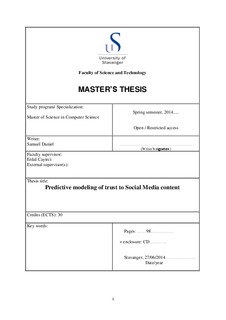Predictive modeling of trust to social media content
Master thesis
Permanent lenke
http://hdl.handle.net/11250/221459Utgivelsesdato
2014-06-27Metadata
Vis full innførselSamlinger
- Studentoppgaver (TN-IDE) [841]
Sammendrag
In recent years, social networking sites have got a massive popularity because they let people to devise a public profile within a tied system. As the popularity increases and they became widely used as one of the important sources of news, people become more cautious about determining the trustworthiness of the information which is disseminating through social media for various reasons. For this reason, knowing the factors that influence the trust in social media content became very important. In this thesis, we use a survey as a mechanism to study trust in social networks. First, we prepared a questionnaire which focuses on measuring the ways in which social network users determine whether content is true or not. And then we analyzed the response of individuals who participated in the survey and discuss the results in a focus group session. Then, the responses, we get from the survey and the focus group was used as a dataset for modeling trust, which incorporates factors that alter trust determination. The dataset had initially 108 records, but subsequent to preprocessing a total of 106 records were used for building the models.
In this research, linear regression, logistic regression, Poisson regression and negative binomial regression were applied on our dataset. According to the results of the various types of tests done on these models, we concluded that the logistic regression model is the most reasonably accurate regression model for trust in social networks. R and Minitab were the tools that were used for the analysis.
In this thesis, an endeavor was made to apply the Decision Tree, Bayesian Classifiers and Neural Network predictive data mining techniques in significant social media factors for predicting trust. To accomplish this goal: The WEKA data mining tool was used to evaluate the J48, Naïve Bayes and Multilayer Perception algorithms.
Distinct experiments were made by performing adjustments of the attributes and using various numbers of attributes in order to come up with a purposeful output. After comparing the resulting models using WEKA’s experimenter we concluded that Multilayer Perception algorithms was the best suited classification model in comparison with Naïve Bayes and J48 algorithms.
Moreover, the most determinant factors when it comes to predicting trust were identified. Namely, these are Age, Years of use, Important news source, Favorite social network site, Gender and Number of people sharing. Overall, this research has verified that regression and data mining techniques are worthwhile to scale up the efficiency of trust modeling and prediction process.
Beskrivelse
Master's thesis in Computer science
